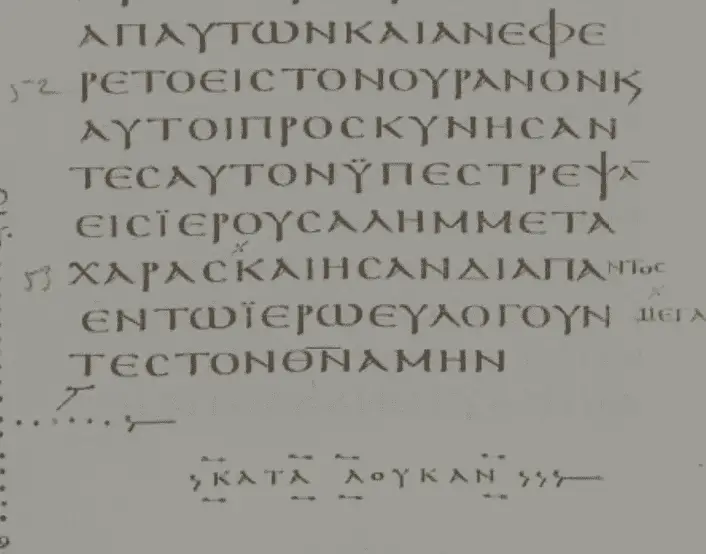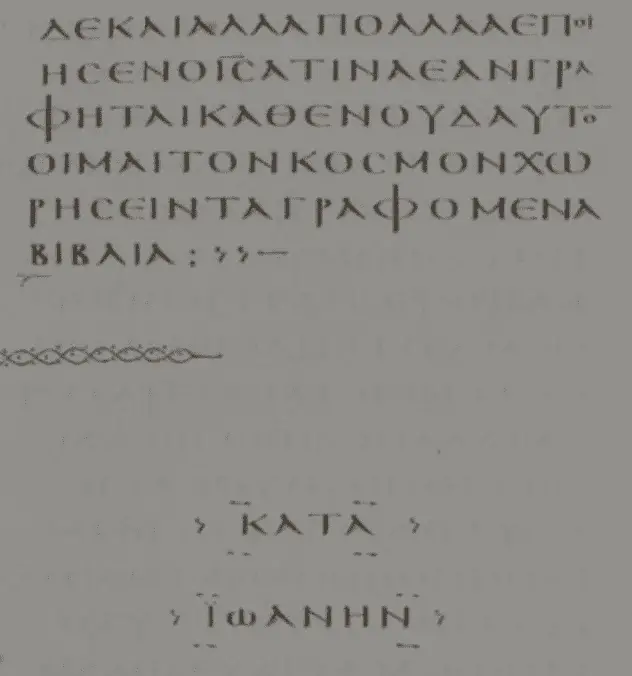
Headings and titles are everywhere throughout the Bible. Most chapters begin with a heading and one can usually find some kind of heading in the middle of many chapters. Oftentimes when I hear people read their Bibles out loud in church or in a Bible study, the person includes the heading in the reading. The question I want to answer in this article is whether or not these headings are inspired by God and, thus, Scripture, and whether or not these headings are beneficial to the reader?
Most of the headings and titles in the Bible are not inspired by God. They were created by modern translators and editors. However, some headings, such as the superscriptions in the book of Psalms, are inspired by God and are considered Scripture. The non-inspired headings can be helpful at times.
Headings in the Bible: Some Inspired, Most Not Inspired
Non-Inspired Headings and Titles
The majority of the headings and titles throughout the Bible have been added by the translators and editors from each version of the Bible. Thus, the majority of headings and titles in the Bible are not inspired by God and, thus, not Scripture. Each Bible version chooses where to put their headings and titles and what those headings and titles should be. For most English Bibles, the added, non-inspired, headings and titles are usually (but not always) emboldened.

For example, the editors and translators of the ESV have added numerous headings to Matthew 2:13–3:17:
- “The Flight to Egypt” (2:13–15)
- “Herod Kills the Children” (2:16–18)
- “The Return to Nazareth” (2:19–23)
- “John the Baptist Prepares the Way” (3:1–12)
- “The Baptism of Jesus” (3:13–17)
The headings in Matthew 2:13–3:17 are different in each version of the Bible. Some may have them in the same place and some may not. Some headings may be similar in content, but some may not. It is up to each Bible version’s translation and editorial team.
Inspired Headings and Titles
To the surprise of some, there are headings and titles in the Bible that are part of the biblical text and are inspired by God. The majority of these inspired headings are in the book of Psalms. Let’s take a look at Psalm 51 for our example. Psalm 51 has two headings. The first heading in the ESV is “Create in Me a Clean Heart, O God.” As you can see from the below picture, it is emboldened. Thus, that is the non-inspired heading created by the translator and/or editorial board.
The title underneath “Create in Me a Clean Heart, O God” that is in superscript text is part of Psalm 51 and, thus, is inspired by God and Scripture:

“To the choirmaster. A Psalm of David, when Nathan the prophet went to him, after he had gone in to Bathsheba.”
PSALM 51:0
The superscript titles (in tiny uppercase letters) throughout the book of Psalms are all inspired by God. They were put there either by the author of the individual psalm or the original compiler of the Psalter. These headings and titles are Scripture. Many Christians, however, do not know they are Scripture because our modern Bibles do not assign them a verse number. This is a travesty because it misleads the readers of the Bible into thinking portions of the Bible are not Scripture when they in fact are. Of further interest is that the Hebrew Bible (BHS) does assign the superscript headings and titles verse numbers, which is why the Psalm versification is very different in the Hebrew and English Bibles. For more information on versification, see my article here.
Knowing that the Psalter superscript headings and titles are inspired by God and are part of Scripture is extremely important and helpful for understanding many Psalms. For example, many Psalms state who the author was. Because of the superscript headings, we find that many Psalms were written by king David (Pss 2-9; 11-32; 34-41; 51-65; 68-70; 86; 101; 103; 108-110; 122; 131; 133; 138-145) and one was even written by Moses (Ps 90)!
Not only do the Psalter superscript headings and titles tell us who wrote many Psalms, but they also give us valuable information about the content and how to interpret them. For example, knowing that Psalm 51 is king David’s words after he committed adultery with Bathsheba and was rebuked for this sin by God through the prophet Nathan helps us understand the content of the Psalm—it is a prayer of repentance.
Heading and Title Confusion in Modern Bibles
Unfortunately, our English Bibles are not all consistent in the way they approach headings and titles, which can add confusion. My goal here is point out some of these inconsistencies so that you, the reader, are better equipped to discern what is the Word of God and what has been added by editors. I’ll use the ESV in my examples, because that is my English Bible of choice.
First, as I mentioned earlier, there are headings and titles in Scripture outside of the book of Psalms. I good example is Proverbs 30:1a, which says:
“The words of Agur son of Jakeh. The oracle.”
PROVERBS 30:1a
Although Proverbs 30:1a is a heading just like Psalm 51:0, it is not superscripted. Thankfully, it is formatted as if it is in the biblical text (which it is) and it is given a verse number, unlike the headings in the Psalter.
Second, some headings in the Bible look like the Psalter superscriptions, but are not Scripture and have been added by the translators and editors. This is the case in the Song of Songs. In addition to the emboldened headings, the translators and editors have also added the superscript (words in all tiny uppercase letters) “She,” “He,” and “Others” to the biblical text.

These headings look just like the inspired headings in the Psalter, but they are not inspired in the Song of Songs. These superscriptions have been added by the translators and editors.
Finally, it is not commonly known that all complete extant (found) manuscripts of the four Gospels (Matthew, Mark, Luke, and John) include the Gospel title. The below four pictures are from the 4th century Vaticanus manuscript and include all four Gospel titles.




As seen above, at the end of each Gospel, a title is given:
- ΚΑΤΑ ΜΑΘΘΑΙΟΝ (“According to Matthew”)
- ΚΑΤΑ ΜΑΡΚΟΝ (“According to Mark”)
- ΚΑΤΑ ΛΟΥΚΑΝ (“According to Luke”)
- ΚΑΤΑ ΙΩΑΝΝΗΝ (“According to John”)
It has thus been argued that the titles to the Gospels could be part of the original manuscripts. If so, then these would also be inspired Scripture and should be flagged by editors of modern Bibles in some way. Our modern Bibles certainly give each Gospel a title, but they do not indicate that it is (or may be) inspired by God and, thus, Scripture.
The Benefits and Deficiencies of Non-Inspired Headings
I hope everyone reading this can agree that the inspired headings and titles are beneficial. But are the non-inspired, translator and committee created, headings and titles beneficial? The answer is somewhat subjective, so here is my subjective answer. I think the headings and titles in the narrative portions of the Bible are very helpful because they help us quickly find and identify the stories. If I want to quickly find the story of Joseph, I can flip through Genesis until I get to the heading “Joseph’s Dreams” in Genesis 37. If I want to know where in Luke’s Gospel Jesus is crucified, I just flip through it until I find the heading that mentions his crucifixion. The ESV reads, “The Crucifixion” just above Luke 23:26.
Unfortunately, I find most of the headings in the non-narrative portions of Scripture (such as the psalms, prophets, letters, etc) vague and generally unhelpful. For example, most of the Psalm headings simply quote a random line from the psalm. Psalm 119 is a great example. The heading of Psalm 119 is simply a quote from verse 105a: “Your Word Is a Lamp to My Feet.” This heading doesn’t tell the reader anything about Psalm 119 and seems quite pointless. For the headings to be beneficial, they must accurately inform the reader of the content of that portion of Scripture, and I find that most of the headings in the non-narrative portions of the Bible simply don’t do that and, thus, should be removed.
Summary and Concluding Thoughts
Most of the headings and titles in our modern English Bibles are created by that particular Bible version’s translator and editorial team, which means they are not inspired by God and not Scripture. However, there are some headings and titles that are part of the original text and those are inspired by God and Scripture. Unfortunately, the formatting of our modern English Bibles is not always clear as to which heading is Scripture and which is not Scripture. All inspired headings are beneficial. For the most part, non-inspired headings are beneficial, although I personally don’t think those in the non-narrative portions of Scripture are very helpful.
Is any of this important? I think it is. As disciples of Jesus and lovers of God’s Word, we need to know exactly what is Scripture and what is not (i.e., what is inspired and what is not). The inspired headings help us better understand the biblical text. This is seen clearest in the Psalms when many of them tell us the identity of the author, the historical circumstances surrounding the writing of the psalm, even the kind of music that is to be played in order to sing the psalm!
What personally bothers me is that the non-inspired headings and titles are frequently treated as inspired Scripture. More often than not, the non-inspired headings are read during the public reading of Scripture, which should never be done. Further, more often than not, I hear Christians use the non-inspired headings as their chief exegetical tool for understanding a passage rather than biblical text itself! This is bad practice because it relies on fallible man to understand the text and not on the biblical text itself alongside sound exegetical method (something too infrequently taught in churches). If the non-inspired headings and titles were removed, it would force more Christians into studying the biblical text.
